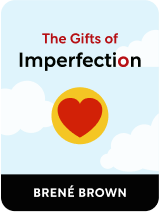

This article is an excerpt from the Shortform book guide to "The Gifts of Imperfection" by Brené Brown. Shortform has the world's best summaries and analyses of books you should be reading.
Like this article? Sign up for a free trial here .
Why should we stop comparing ourselves to others? What damage can it cause? Are there any benefits that come from comparison?
Brené Brown, the author of The Gifts of Imperfection, asserts that comparing ourselves to others causes emotional damage and stops us from living authentically. She says that one way to fight comparison is to embrace our creativity because it cultivates individuality.
Continue for more of Brené Brown’s take on comparison, and whether or not the research supports her claims.
Rejecting Comparison
We all tend to compare ourselves to others. However, Brené Brown’s next strategy for living Wholeheartedly (and being yourself in the process) involves rejecting the temptation to do this due to the emotional damage that comparison can do. Instead of comparing ourselves to others, we should be happy to be who we are.
In The Gifts of Imperfection, Brown presents the chapter on comparison as an exploration specifically of how we can use creativity to stave off unhealthy self-comparison to others. Before we address this point about creativity, let’s learn about why we should be avoiding comparison in the first place: in other words, why it’s so damaging.
The Problem With Comparison
According to Brown, comparison’s damage lies in the fact that it involves both competition and conformity. She acknowledges that at first, this might seem counterintuitive. How can we both compete with others and strive to conform at the same time?
To address this question, Brown argues that competition and conformity feed into each other when you want to be the “best” in your particular social or societal group—when you want to conform to that group’s standards and do so “better” than everyone else. You abandon attempts to be and accept your true self, as well as efforts to see your own worthiness. Instead, you focus on “winning” in comparison to your peers.
(Shortform note: Comparison is also arguably at odds with two of Brown’s “gifts of imperfection.” Comparison can harm your connections with others: If you compare yourself to someone and decide that you’re “worse” than they are, you might become jealous or envious. These negative feelings will erode your bond. Likewise, comparing yourself to someone else and deciding that you’re “better” than they are (and, by extension, they’re “lesser”) isn’t a good foundation for a strong, equal connection—and it isn’t particularly compassionate, either.)
| Is Comparison Always a Bad Thing? In The Gifts of Imperfection, Brown frames comparison as a strictly negative practice because of its harm to worthiness. But can comparison ever be a good thing? Some research indicates that comparing ourselves upwardly to others—in other words, comparing ourselves to people who we view as “better” than we are in some way—can actually have some positive effects. These include: Improving our self-esteem, if we realize we have things in common with the person we think is “better” than we are. Clearly, we’re as “good” as they are in some respects. Facilitating self-improvement. Realizing that someone is “better than us” in a certain area can help us to improve, as we can learn from this “better” person and improve our own performance. This “better” person can also serve as an inspirational figure to motivate us to improve. Furthermore, a review of studies on social comparison in students found that students who compared themselves upwardly to higher-performing classmates improved their academic performance. However, the same review of studies notes that upward comparison also had harmful effects on students, such as feeling negative emotions and judging their own academic abilities more harshly. In sum, whether upward comparison can ever be wholly positive is unclear. |
Using Creativity to Fight Comparison
If comparison is so damaging, why do so many of us engage in it? The answer is that letting go of comparison can be a tricky task: As Brown notes, this way of thinking is deeply ingrained in many of us.
However, Brown believes that you can reduce your temptation to compare by recognizing and celebrating your individuality. Furthermore, she states that you can cultivate your sense of individuality by being creative. Paint, draw, sew, invent new recipes, sculpt, write: Do anything that indulges your creative side.
According to Brown, being creative cultivates individuality because it involves producing something original using your unique skills. Nobody else has the same creative skillset as you or expresses their creativity in the same way as you. Therefore, your creative talents represent a part of you that’s individual and incomparable.
| The Benefits of Creativity Creativity isn’t just beneficial to your sense of individuality. Research has shown that being creative can improve your mental and physical health in various other ways, too. For instance, a 2010 review of the existing literature on creativity’s health benefits found that being creative has beneficial effects like: Helping people to process trauma, reducing anxiety, enabling people to express difficult thoughts and motion, reducing stress, and compassion fatigue among carers. Other research has suggested that creativity can improve the emotional wellbeing of dementia patients and assist with chronic pain management. One study even found that being creative can increase the CD4+ lymphocyte count of HIV patients—in effect, strengthening their immune systems. While researchers are still unclear on why creativity can have such potent health benefits, the evidence suggests that a link between creativity and improved health at least exists. |

———End of Preview———
Like what you just read? Read the rest of the world's best book summary and analysis of Brené Brown's "The Gifts of Imperfection" at Shortform .
Here's what you'll find in our full The Gifts of Imperfection summary :
- How to stop feeling like you're not "good enough"
- How shame affects your self-worth
- The 10 guideposts to living Wholeheartedly and cultivating worthiness






